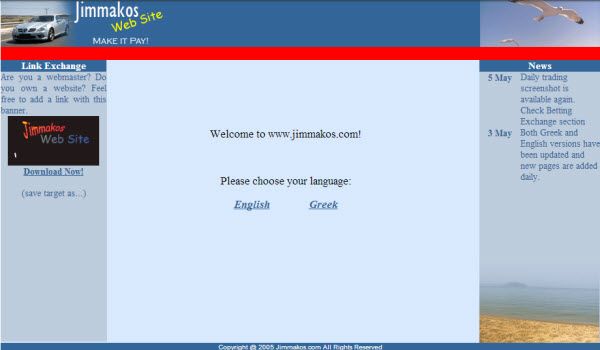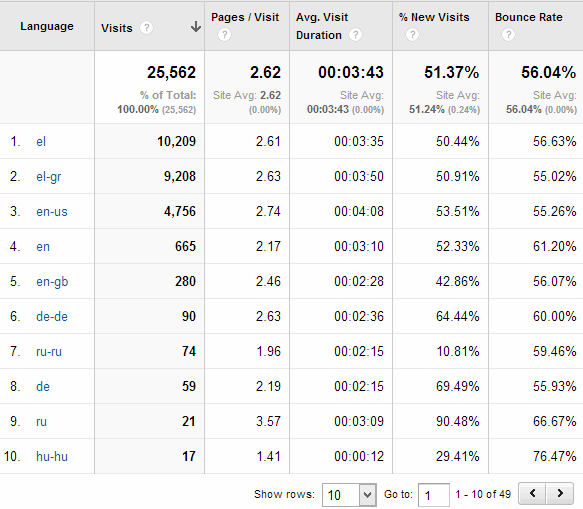I am blogging about gambling both in English and Greek. This multilingual blogging has been a burden when building a community. Greek audience wants to read Greek posts, while English-speaking followers can’t understand a single Greek word I am tweeting. So, how do I manage multilingual blogging?
I don’t.
But let’s take my blogging from the beginning.

Back in 2005 I registered this very blog, meant to become my personal blog. I started blogging in English, wanting to get in touch with fellow gamblers from around the world. I had no idea of blogging and in all honesty I must have posted some terrible posts, that didn’t exceed 100 words! I know, a total SEO disaster!
Remember though, Google Authorship Markup didn’t mean anything back then!
Anyway, my blog (blogs were still known as “websites” back then, duh!) gained in popularity mainly due to regular updating. Although new posts were short and more often than not they were just 2 lines of words accompanied by an image, people seemed to eagerly wait for my updates that were usually posted in the evening. Back then I used to post my daily P&L screen when I had finished trading at Betfair.
That is something I no longer do and I would strongly suggest you avoid it as well if you are bragging about your profits. Don’t be afraid of admitting of your losses though. But that’s another story.
Long story short, Greek visitors heard of my gambling blog and began spreading the word.
Why would Greek visitors make any difference? Because if you read my about page, you’d know by now that I myself am Greek!
So, they began asking me if I could translate my popular posts in Greek. Obviously not the single-sentence posts but the more juicy ones. The posts where I described how I traded or pointed out the importance of correct money management in Betfair trading.
And then things went wild for my blogging, because, believe it or not, I convinced myself to publish the same article in two different languages!

I had become a translator apart from blogger! Believe me, it’s surely an exciting feeling to press the publish button when you have finished editing a post, but at the same time it’s a nightmare thinking that I had to do it all over again from the beginning! Perhaps I didn’t have to think of a new topic, start from scratch or be original, but that didn’t mean it was an easy task.
It was more like a tedious task.
Concurrently, my gambling blog had been converted into a multilingual blog, offering two editions. The EN(glish) and the GR(eek) one. As if my blog was that popular! We are talking about 200 visitors per day max!
Apart from forcing me to think twice before blogging (for every idea that crossed my mind I had to write two articles to please every reader!), that created all sorts of problems SEO-wise. The multilingual blog now featured a different URL for the same article depending on the written language.
Yet, the URLs only differed in that tiny detail: the language abbreviation. The original post featured the “en” letters while the Greek one changed that to “gr”. That was all. The actual post’s title was still used for creating the rest of the URL for both articles!

How bad was that? Well, it’s a pity I don’t have a Google Webmaster Tool screenshot available to show you the countless warnings for duplicate content my blog was generating! Not to mention that the EN version of my blog was a perfect duplicate of the actual homepage! Come to think of it, it was a miracle my blog climbed up to Pagerank 4 at one point!
Fast forward to today, I have separated my English and Greek blogging activities since 2010. By creating a Greek blog, Greek readers no longer need to keep an eye on my English blog. At the same time, non-Greek visitors are worried no more if they bump into a strangely-written post by mistake.
So, what is now the problem of multilingual blogging?
You see, it’s not 2005 anymore. That means sharing your posts at social media, being active at Twitter and promoting your content at LinkedIn is important for your blog’s success. For your words to reach out more readers.
“Great, what’s wrong with that?”
It’s not wrong, it just complicates my communication skills.
Let’s explain why.
By the time I finish writing this post and publish it in my blog, I will share it to my Facebook, Twitter, Google+, LinkedIn, StumbleUpon and Digg account. Of course I will use a small description in English when sharing, giving a few more details about this post. Hopefully those details brought you here!
All is well, right?
Wrong!
There are Greek friends in my Facebook, Greek followers in my Twitter, Greeks in my Google+ circles, Greek professionals in LinkedIn. They won’t be attracted by the English title nor description. I might sound snob by the way, writing in English when they know I am Greek.
But that is not the problem!
The real problem appears when I blog in Greek!
Greek people do speak or understand English. They won’t have trouble understanding the meaning of my status. They may be reluctant to read my new post, sure, but hopefully some of them will give it a try. Some may have trouble understanding every word of it, but in the end they know what I am talking about.
I bet Europeans, Americans, Australians, Asians and Africans don’t speak Greek. And my blogs’ traffic does come from all the continents! So, when I share my new Greek blog post, they have absolutely no idea what I am talking about if I shout it in Greek! Zero. Nil.
“Well, ok, you want Greeks to read your Greek posts and everyone else to read the English ones.”
That’s not entirely true. I seem to publish stuff in my Greek blog that appeals to people abroad. Don’t take my word for it, I can show you my Greek blog’s traffic. It’s not some kind of secret.

As expected, traffic from Greece pretty much blows everything else into pieces. Yet, visitors from Europe and US do take a peek inside! And since I began tweeting and sharing my posts using English descriptions so that I don’t drive English-speaking followers away, I noticed an increase of foreigners in my Greek blog.
The encouraging statistic of the image above is that Russians, Germans and British visitors do spend time in my Greek blog! Note, there is almost nothing written in English in there! I just hope online translators don’t make my posts more complicated than they already are.
Still, I wouldn’t worry too much if I didn’t receive the following request almost daily:
English version please?

I find it easier to blog in Greek. That leads me to write more often in Greek throughout the day about online gambling’s rock-solid facts, statistics of the gambling industry, comparison of earning reports announced by gaming operators and so on. As you see the topics are not necessarily targeted to the Greek gambling industry.
Therefore, fans from abroad are interested to read that last blog post of mine. Even if it is written in Greek. They will still try reading it! Remarkable.
What is the solution if you blog in multiple languages?
Unfortunately I haven’t found it yet.
I contemplated creating separate social media accounts for my Greek mumblings. Doing so, Greek followers, fans and readers would connect with me through the new profiles. Non-Greek readers would no longer read a Greek status update from me via my original profiles and I wouldn’t scare them off.
There were two issues.
- The most important was starting all the way from the beginning, creating new profiles, choosing new nicknames and eventually make myself heard, so that Greeks moved over to my new profiles. I am talking about A LOT of work and I am still doubtful of the final outcome.
- The other issue is that I would have two official profiles for Jim Makos, the writer/blogger, each in different language! That doesn’t sound right, does it? It would look like I have a bipolar personality disorder or something. Even world-class non-English writers don’t do that!
On the other hand, it has been just 3 months since I converted my personal Facebook profile to a business page! No more changes please.
So, what do you think? What would you do if you blogged in two languages? What do you do if you manage multilingual blogs? What do you suggest? Let me know in the comments below.


